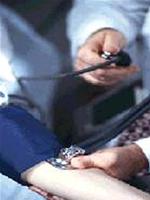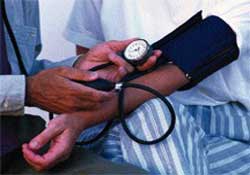What is the significance of the substantial difference between systolic blood pressure (SBP) and diastolic blood pressure (DBP)? The difference in values between systolic and diastolic blood pressure is known as pulse pressure.
For example, if resting blood pressure is measured at 120/80 millimeters of mercury (mm Hg), then the pulse pressure is 40, which is the difference between 120 and 80. Certain conditions can increase pulse pressure, such as aortic valve disease, severe anemia, and hyperthyroidism.
 |
| High blood pressure is likely to occur in aggressive individuals (Photo: Ykhoa) |
However, the most significant cause of increased pulse pressure is the hardening and inflammation of the aorta, the largest artery in the body. This condition can result from hypertension or the presence of plaque in the arterial walls (causing atherosclerosis). The greater the difference between systolic and diastolic blood pressure, the more the vascular walls may have hardened and suffered damage. Evidence suggests that pulse pressure can be a good indicator of heart health, especially in older adults.
However, systolic blood pressure is the best indicator for individuals over 50. For those over 60, a pulse pressure greater than 60 mm Hg is considered abnormal. Treating hypertension can often reduce pulse pressure.
If you are healthy, should you not worry about blood pressure?
Hypertension is characterized by a lack of signs or symptoms, which is why it is referred to as the silent killer. Relying only on the feeling of being healthy to assume normal blood pressure is insufficient. The only way to know if you have hypertension is to check your blood pressure. In many industrialized countries, the rate of hypertension is nearly one-third of the population; in the United States alone, at least 65 million people suffer from hypertension.
Is hypertension only a concern for older individuals?
Although older adults are at a greater risk for hypertension, they are not the only group affected; children can also suffer from hypertension. Don’t assume that being young means you don’t need regular blood pressure checks or lifestyle changes like quitting smoking or maintaining a healthy weight. Anyone can develop hypertension.
If I don’t eat salty food, can I ignore hypertension?
Eating less salt is an important part of controlling blood pressure. Individuals should consume less than 2.4 grams of sodium per day, equivalent to one teaspoon. This amount is for the entire day, not just an additional amount during meals. Canned foods and other processed items often contain high levels of salt. Therefore, if you read food labels to check sodium content, you may be surprised by how much you have consumed.
Is hypertension only a concern for those who are always stressed?
Anyone can develop hypertension regardless of their personality. If you lead a life full of conflict, stress, and worry, it doesn’t necessarily mean you will have hypertension. Conversely, even if you live a carefree and calm life, you are not immune to the condition.
Managing stress remains an important factor, as stressful situations can temporarily raise blood pressure; over time, ongoing stress or accompanying hypertension can damage arteries, leading to harm to the heart, brain, kidneys, and eyes.
What are the consequences of untreated hypertension?
|
|
|
Regular blood pressure monitoring is essential (Photo: VNN) |
The arterial walls endure excessive pressure due to hypertension, which can severely damage many vital organs in the body.
In general, the higher the blood pressure or the longer it remains uncontrolled, the greater the damage. If you are unaware of your blood pressure, you should have it checked by a healthcare professional. Being aware of your blood pressure and knowing what to do if it’s high can help prevent serious complications caused by hypertension, such as stroke, heart failure, myocardial infarction, kidney failure, and blindness.
What are the main causes of hypertension?
Lifestyle factors such as smoking and stress can contribute to hypertension, but for most people, the cause of hypertension is unknown. Some contributing factors are uncontrollable, such as age, race, and family history, but many other risk factors can be managed, including obesity, tobacco and alcohol use, high salt intake, and lack of physical activity.
If you are an adult and do not have a history of hypertension, how often should you have your blood pressure checked?
If your blood pressure is normal, under 120/80 mmHg, you should have it checked at least once every two years or each time you visit your healthcare provider. If you have a history of hypertension or have conditions such as diabetes, heart disease, or kidney disease, you should be monitored more frequently.
If my blood pressure is consistently good at home but always high in the doctor’s office or hospital, should I be concerned?
This may be due to “white coat syndrome,” which refers to temporary hypertension that occurs when you see a doctor due to anxiety. The healthcare provider will help determine if your hypertension only occurs during medical visits or if it is a true hypertension problem. Even if your blood pressure is normal at home, you should still check it more frequently and follow a blood pressure management plan, such as dietary changes, quitting smoking, limiting alcohol intake, exercising, and managing stress.
Which population groups are at the highest risk for hypertension?
Black individuals or African Americans are the population group at the highest risk for hypertension; they can be affected from a young age, and their average blood pressure is also higher than that of other racial groups. Hypertension is often more severe and progresses more rapidly in Black individuals.
If hypertension often runs in families, does that mean you will also have it?
Hypertension is a condition that can be avoided even if it runs in families. It is often preventable through the following measures: maintaining a healthy weight, leading an active lifestyle, eating plenty of fruits and vegetables, reducing salt intake, and limiting or completely avoiding alcohol. If your family has a history of hypertension, take preventive steps now to avoid hypertension later; consult with your healthcare provider about what actions to take to reduce your risk.
If my blood pressure is below 149/90 mmHg, can I ignore hypertension?
Guidelines for managing hypertension have changed since spring 2003 and have established new values for normal blood pressure. Blood pressure below 140/90 was once accepted, but today if blood pressure is above 120/80 but below 140/90, it is still considered prehypertension, meaning that hypertension can still become a problem if not treated to reduce it. Normal blood pressure should be below 120/80.
Is medication all that is needed to treat hypertension?
It should not be assumed that only medication can reduce hypertension. Lifestyle changes are also very important, such as a diet rich in fruits and vegetables, daily walking, and not smoking. Lifestyle changes can even enhance the effectiveness of medications and sometimes reduce blood pressure enough to lower daily medication doses.
Is using salt substitutes a safe way to reduce salt intake?
Many salt substitutes still contain sodium chloride. If you use a lot of salt substitutes for flavor, you may end up consuming more salt than necessary. Additionally, there is another potential issue: potassium chloride is a common additive in table salt; too much potassium can cause harm if there are kidney problems.
Therefore, it is important to consult a healthcare provider before using salt substitute products. Instead of using salt substitutes, try using herbs and spices like basil, cilantro, or chili powder to enhance flavor without raising blood pressure.
Which foods contain the least salt?
You may be surprised by the hidden sodium content in some commonly used foods. Therefore, it is essential to read the labels on various products. Do not consume more than 2300mg of sodium per day, equivalent to one teaspoon. If you have hypertension, you need to further reduce your daily sodium intake. When a label states “salt-free” or “sodium-free,” it means there is still a small amount (under 5mg) of sodium per serving.
What is the Best Diet to Try for Lowering Blood Pressure?
A diet rich in fruits and vegetables, along with low-fat dairy products, can help reduce blood pressure, but it typically takes about two weeks of adherence to see results. Research has focused on a diet known as DASH, which includes low-fat and low-cholesterol foods; whole grain products, fish, poultry, and reduced red meat, as well as avoidance of sweets and sugary beverages.
Is at Least One Hour of Physical Activity Required to Lower Blood Pressure?
Engaging in at least 30 minutes of moderate exercise daily or five days a week can help prevent or control high blood pressure. If you’re too busy, you can break it into several sessions of 10 minutes each. Additionally, parking farther from your workplace, getting off the bus a few stops early to walk, or spending half an hour washing your car or gardening can also be beneficial.
If you are overweight, how many kilograms do you need to lose to lower your blood pressure? Losing about 4.5 kilograms is often sufficient to make a difference in blood pressure. It is important to achieve a healthy body mass index. Therefore, a healthcare provider will advise how much weight to lose and the best strategies to achieve weight loss.
Do Birth Control Pills Increase Blood Pressure?
Birth control pills can cause a slight increase in blood pressure, but usually not enough to raise it above normal levels. The risk of developing high blood pressure is higher for women who use oral contraceptives, so healthcare providers often recommend that women monitor their blood pressure every six months. Additionally, women over the age of 35 who smoke while taking birth control pills are at an increased risk of hypertension.
How to Ensure Accurate Blood Pressure Readings?
Since blood pressure can be affected by lifestyle habits and activities, certain conditions should be met to ensure accurate readings. Eating, drinking caffeinated beverages, smoking, and having a full bladder can all alter blood pressure readings. Inform your healthcare provider of any activities that may impact your blood pressure measurements.
Dr. Đào Xuân Dũng



















































